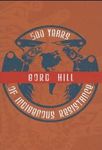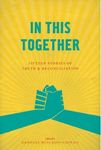National Day for Truth & Reconciliation
←
→
Page content transcription
If your browser does not render page correctly, please read the page content below
SEPTEMBER 30
National Day for
Truth & Reconciliation
Truth and Reconciliation
Commission of Canada
Canada’s residential school system for Aboriginal
children was an education system in name only for
much of its existence. The residential schools were
created for the purpose of separating Aboriginal
children from their families, in order to minimize and
weaken family ties and cultural linkages, and to
indoctrinate children into a new culture — the culture
of the legally dominant Euro-Christian Canadian
society. The schools were in existence for well over
100 years, and many successive generations of
children from the same communities and families
endured the experience of them.
One of the 94 calls to action from the Truth and The National Day for Truth
Reconciliation Commission is for the corporate sector and Reconciliation will
in Canada to provide education for management and provide an opportunity for
staff on the history of Aboriginal peoples, including corporations and individuals
the history and legacy of residential schools, the to recognize and
United Nations Declaration on the Rights of commemorate the legacy of
Indigenous Peoples, Treaties and Aboriginal rights, residential schools.
Indigenous law, and Aboriginal-Crown relations. This
will require skills based training in intercultural
competency, conflict resolution, human rights, and
anti-racism.
This document is not intended to be an exhaustive list of resources, but a scan of material
that is available. If we have provided anything that is inappropriate, please let us know.
EMAILTruth and Reconciliation
Commission of Canada
Reconciliation requires that a new vision, based on a commitment to mutual respect, be developed. It also
requires an understanding that the most harmful impacts of residential schools have been the loss of pride
and self-respect of Aboriginal people, and the lack of respect that non-Aboriginal people have been raised to
have for their Aboriginal neighbours. Reconciliation is not an Aboriginal problem; it is a Canadian one.
-Truth and Reconciliation Commission report
In 2015, the Truth and Reconciliation Commission of
Canada (TRC) published its final report detailing the
experiences and impacts of the residential school
system, creating a historical record of its legacy and
consequences. One outcome of the report was a
document detailing 94 calls to action across a wide
range of areas including child welfare, education,
health, justice, language and culture.
94 CALLS TO ACTION
Indian Residential School
System - History & Legacy
What Happened? [video] – Interview with
Dr. Mary Wilson, TRC Commissioner
Reconciliation and Residential Schools –
National Centre for Truth and
Reconciliation
TRUTH AND RECONCILIATION
COMMISSION OF CANADA
ALL RESOURCES IN THIS DOCUMENTS ARE LIVE LINKSreading & resources
United National Declaration on the Rights 27 Tips on What to Say and Do When Working
of Indigenous Peoples – Indigenous and Effectively with Indigenous Peoples
Northern Affairs Canada
23 Tips on What Not to Say or Do When Working
UN Declaration on the Rights of Effectively With Indigenous Peoples
Indigenous Peoples – Indigenous
Foundations University of British Columbia 22 Ways to Derail Your Next Indigenous
Community Meeting; a checklist of common
National Narrative Report, by mistakes and why you should avoid making
Reconciliation Canada, 2017 them
Truth and Reconciliation reports (various) 26 Ways to Derail Your Next Indigenous
Reconciliation Canada, Impact report, 2017 Community Meeting
Business Reconciliation in Canada
Guidebook, Canadian Council for RISE Consulting Resource List
Aboriginal Business
Building Inclusion for Indigenous Peoples
in Canadian Workplaces, Catalyst report
CSLA Reconciliation Advisory Committee
resources
videos activities
Impact Stories, Reconciliation Canada Walk for reconciliation
Reconciliation Video Project, Community Action Toolkit
University of Calgary, under
construction Sept 2021 Create a group and/or individual
'Back Pocket Reconciliation Plan'
Assorted films/documentaries CBC.ca
150 Days of Reconciliation
Alberta Professional Planners
Institute - Community Planning and
the Fort McKay First Nation
June 2021training
Post-secondary training Self-paced module training
Countering Stereotypes of Indigenous Peoples, Indigenous Awareness Training Understanding
open studies at University of Alberta (NS 161); Cost: Aboriginal and Treaty Rights, Calliou Group; Time:
for credit $1431.59; non-credit auditor access (for 75 minutes; Cost: $25/person
informational purposes only) $304.56; Time: Sept
1-Dec 7 online asynchronous Indigenous Awareness Canada training ($48 for
"This course pulls the rug from underneath Introduction course, $128 for each additional
settler-based constructions of Indigeneity. course) $198 for four courses (bulk licences
Taking up the most prevalent stereotypes of available)
Indigenous people, the course will provide
context and reflection-based learning to give Reconciliation Learning Experiences for
students the ability to unpack and challenge Organizations, Reconciliation Canada
the narratives that both skew the lived Reconciliation Dialogue Workshop: Professional
experience of Indigenous peoples and allow the Learning Experience, Reconciliation Canada:
replication of stereotypes that reinforce Time: 1/2 day; Cost: TBD (information request
colonial relationships." sent Sept 1)
Also have one-hour lunch and learns.
Indigenous Peoples and Technoscience, open Indigenous Canada MOOC, University of Alberta;
studies at University of Alberta (NS 115); Cost: for free online; Time: 2.5-4 hours per week for 12
credit $1431.59; non-credit auditor access (for weeks; Cost: free online.
informational purposes only) $304.56; Time: Sept
1-Dec 7 online asynchronous Indigenous Awareness Training - Canadian Version,
"This course introduces students to the long Indigenous Leadership Development Institute;
and complicated relationships between science Time: online Cost: $39.95 per person, bulk
and technology fields, broader dynamics of registrations available for 1000+ (consider for
colonialism, and increasing demands for candidate/registrant training).
Indigenous governance of the sciences and "This course educates participants about the
technologies that affect them." history, traditions, values and beliefs of
Canada's Indigenous Peoples. In accordance
with the Truth & Reconciliation Commission of
Those who wish to attend classes purely on an Canada's Calls to Action (2015)"
informational basis (no credit) can apply to audit
courses by September 16-22 for Fall. Fill out the NVisions - The Path: Your Journey Through
application form (NS 161 or NS 115), sign, and Indigenous Canada™ is a series of five online
submit to nsadvise@ualberta.ca" modules or a full-day in-person or 6-hour virtual
classroom course. Topics include: the cultural and
historical differences between First Nations, Inuit,
and Métis; the evolution of the relationship between
Canada and Indigenous people from pre-contact to
yesterday’s headlines; stories of social and
economic success, reconciliation and resilience;
understanding intercultural communication in the
workplace; and much more. Buy 1 seat for $168.37
($149 + 13% tax), Buy 2 to 9 seats for $149.00 each
(plus 13% tax), Buy 10 to 49 seats for $120.00 each
(plus 13% tax). If you want to buy 50 or more seats,
contact thepath@nvisiongroup.ca for pricingliving culture
Podcasts
Think Indigenous is a podcast that
highlights its yearly conference keynotes
& "Red Talk" presentations sharing best
practices, innovation and delivery models
of Indigenous education.
Unsettled: Journeys in Truth and
Conciliation builds upon the 94 calls to
action of Canada's Truth and
Reconciliation Commission, from the
perspectives of Indigenous cohost Jessica
Vandenberghe, settler cohost George Lee,
and their Indigenous and settler guests.
Indian & Cowboy is an independent,
member supported, Indigenous podcast
network that creates, produces &
publishes Indigenous audio projects Angela Sterritt
across multiple platforms on the internet CBC reporter
& broadcast media. @AngelaSterritt
Red Man Laughing created, written and Red Thunderwoman
hosted by Anishinaabe comedian, Ryan Native Calgarian podcast
McMahon, is an Indigenous arts and
@N8V_Calgarian
culture podcast rooted squarely at the
intersection between the good, the bad
Dr. Pam Palmater
and the ugly between Indian Country and
the mainstream. (Warning: content Warrior Life podcast
contains strong language) @Pam_Palmater
Warrior Life is a podcast by Dr. Pam
Palmater. This past summer, Dr. Palmater
Santee Siouxx – santeesiouxx
posted to her podcast reviews for books
that were a part of her Reconciliation
Book Club. James Jones – notoriouscree
Jana Schmieding (actor on
Red Thunderwoman (colonial name is Rutherford Falls) – janaunplgd
Michelle Robinson) is a Sahtu Dene
bringing an Indigenous perspective to a
variety of topics.You can also read



























































